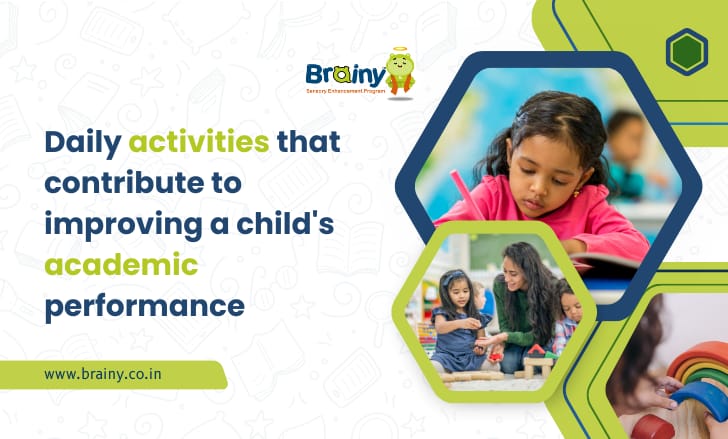There are a lot of things that make or break a child’s academic record. This blog is talking about the activities that we’ve discovered to be the most crucial ones in improving a child’s academic performance.
For the most part of the day, any child is in school or attending various activities. Those places already have the vibe your child needs to focus on studies. But retaining what is learned and completing the homework happens at home. Home is a place where children are most comfortable and also the place where their academics get affected the most.
What the family does is more important than which school their children are in, or how much money they make and how educated the parents are. Even uneducated parents can help grow a genius if given proper attention.
It is imperative to understand the importance of parental involvement, not simply as “homework hand-holder”. Parents are the key players in the development of a child’s personality, character, confidence, motivation and personal responsibility for schoolwork, all of which make up to the academic performance.
We’ve been training children from age 6-16 and learned what activities contribute towards a positive child growth and which ones hamper the same. Here are some of those learnings for the parents who genuinely want to contribute to their child’s academic growth along with building a personality they’d need for the future.
Do Something Creative. Everyday!
Creativity is the best mental exercise for the brain of any age to expand its capabilities. We always advise the parents of children to engage children in some creative activities at home. Merely doodling on a blank paper improves the thinking capabilities and it helps a child build the thoughts.
The process of allowing the child to express independently is very important for development. It helps them cope with their feelings and better handle the problems that they might face. It impedes a child to explore new opportunities and expands the mind to new experiences which shows up in a child’s learning experience.
Use Everyday experiences as a teaching opportunity
Daily rituals, chores, and situations can be the best learning opportunities in a family. Encourage children to ask questions about anything and everything. Don’t give them straight answers but let them figure things out on their own.
Performing daily chores help children learn time management and planning skills. Making them reach their academic deadlines on time and with precision. These are also some of the most important skills in being successful in life and learning it at an early age would definitely help.
Sort out the basics
Nutrition, daily homework and having a regular sleep schedule are some of the most basic things which should be taught to kids. They ensure discipline into their personalities and help them live a better, healthier life in school.
A healthy mind is a great way to go about studying and learning new things and hence contribute to the academic performance of a child.
Physical Exercise
Physical exercises are for healthy well being. But, it's also something that children don’t like at all. However, once made a regular practice it becomes a part of their daily schedule and every parent should make sure that physical exercises are a part of their children's daily chores.
Daily physical stress on the body muscles help children cope with actual life stress. It promotes healthier physical and mental development. Strengthens the bones, muscles, and joints. It helps them gain a better posture and balance over the body. A healthy mind is a great way to go about studying and learning new things and hence contribute to the academic performance of a child.
Have a Specific Study Time
Doing a specific thing every day at the same time keeps the mind and body in sync with the activity. Encouraging creativity and productivity like studying at specific hours daily, say a couple of hours before dinner everyday helps children’s minds attain discipline.
Having a study plan along with a regular schedule helps them in prioritizing and maximizing the work, thereby increasing their productivity. This habit of regular learning is the best for children to start scoring well.
Sleep Schedule
Sleep is the most vital activity for brain development at all stages of life. During the deep sleep sessions, the body gets totally relaxed, increases blood supply to muscles and restores energy. Tissue growth happens and also the damaged tissue gets repaired.
Sleep is also a signal for most hormones in the body to be released, hormones that are responsible for the growth and development of the child both mentally and physically.
Apart from these points mentioned above, let children succeed and fail on their own. You’ve probably heard this popular phrase "Be your child’s biggest cheerleader,". The statement holds great value. A child needs to believe in himself to score great in school. He/she should have confidence that no matter what his report card says, they are valued and loved.
Even if your child is not good at math or science, find out what he is good at & help him nurture that interest. Also, look closely at specific areas that your child struggles with and acknowledge the smallest of accomplishments.
Let your child know you’re proud of who he/she is.
No matter what age you are in, you still follow the same principles, discipline, and learnings that you’ve received from the daily activities you did as a child. Make sure your children are growing with the right habits and activities that help their growth and be academically successful.
One of the Pioneers in this field is BRAINY – A division of Brain Child Learning which helps in Brain Training for Children in the age group of 7 to 16-year-olds. They have a methodology of Training which Involves Meditation / Digitised Music – to open new neural pathways in the brain and Neurobic Exercises which help the mind stay agile and alert. The Blended training provides all-round development of the brain with multiple benefits.
To know more you can refer to Brainy for more information on their training methodology or Google the term “Brain Training Course” or “Brain Training Program” to get a list of training available for helping them develop their overall life skills.
Disclaimer: Every child is unique and Different, hence benefits to each child may vary. The above-mentioned points are observations of the writer and nonbinding you are encouraged to make your own plan and schedule as per the requirements of the child.


